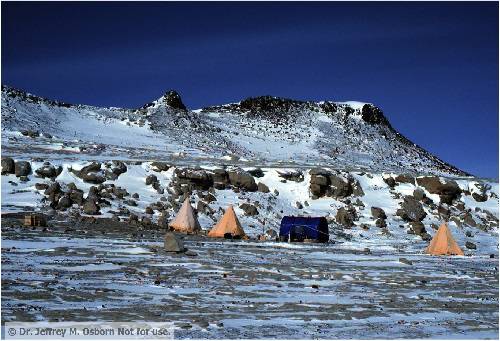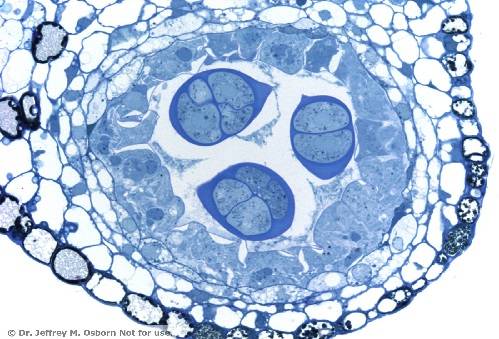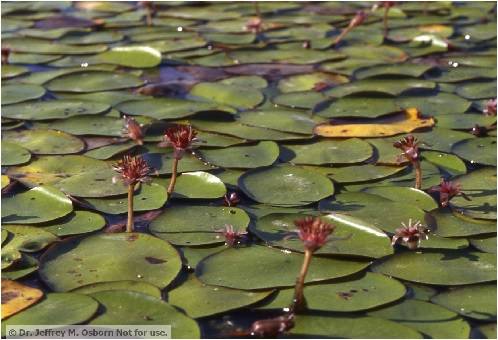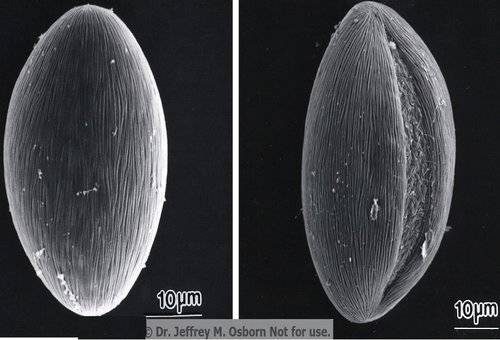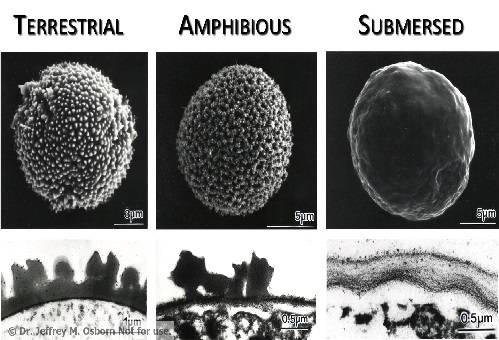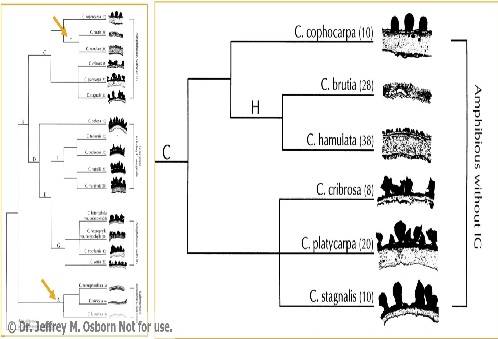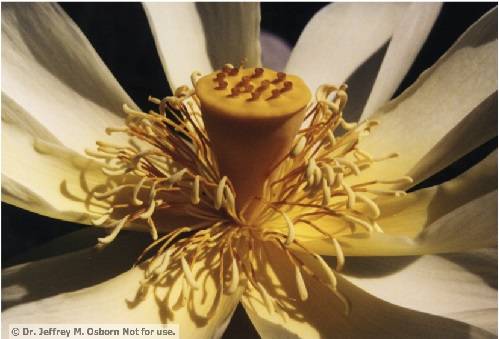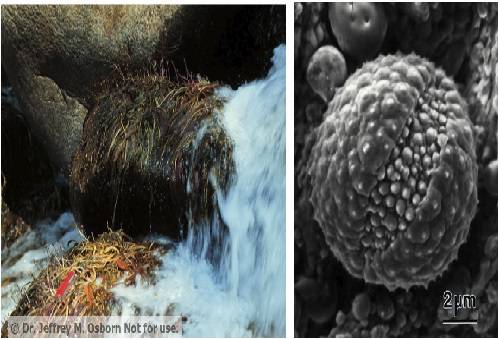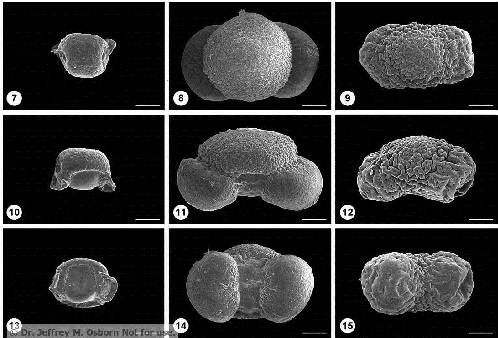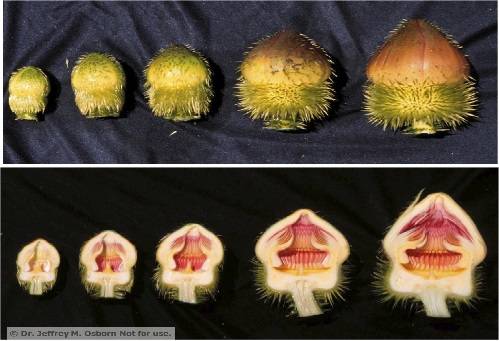Catalog Description
4 hours (offered spring-odd years)
Comparative investigations of the structure, life-cycles, and evolution of fossil and living vascular plants. Emphasis on such topics as: the origin of land plants, evolution of the ovule and flower, and the origin of flowering plants.
Course Syllabus
| Date | Lect/Lab | Lecture Topic | Chapter | |
|---|---|---|---|---|
| 1/9 | Lect | Concepts in Plant Morphology; Vascular plant characteristics | 1-4 | |
| 1/10 | Lab | Microscopy; Tissues of vascular plants | 1, 2 | |
| 1/11 | Lect | Vascular plant characteristics; The origin of land plants | 1-4 | |
|
|
||||
| 1/16 | Lect | The origin of land plants; Early land plants | 2, 7 | |
| 1/17 | Lab | Early land plants; Paleobotany | 3-4, 5 | |
| 1/18 | – | Work on class projects | ||
|
|
||||
| 1/23 | Lect | Early land plants; Psilophyta | 7, 8 | |
| 1/24 | – | University Planning Day | ||
| 1/25 | Lab | Psilophyta | 6 | |
|
|
||||
| 1/30 | Lect | Psilophyta; Lycophyta | 8, 9 | |
| 1/31 | – | Lecture and Lab Exam 1 | ||
| 2/1 | Lect | Lycophyta | 9 | |
|
|
||||
| 2/6 | Lect | Lycophyta | 9 | |
| 2/7 | Lab | Lycophyta I, II | (7, 8) | |
| 2/8 | Lect | Sphenophyta | 10 | |
|
|
||||
| 2/13 | Lect | Sphenophyta | 10 | |
| 2/14 | Lab | Sphenophyta I, II | (9, 10) | |
| 2/15 | Lect | Filicophyta | 11, 12, 13 | |
|
|
||||
| 2/20 | Lect | Filicophyta | 11, 12, 13 | |
| 2/21 | Lab | Filicophyta I, II, III | (11, 12, 13) | |
| 2/22 | – | Work on class projects | ||
|
|
||||
| 2/27 | Lab | Filicophyta III, IV | (13, 14) | |
| 2/28 | – | Lecture and Lab Exam 2 | ||
| 3/1 | Lect | Progymnosperms; Reproductive strategies | 14 | |
|
|
||||
| 3/6 | – | Midterm Break | ||
| 3/7 | – | Midterm Break | ||
| 3/8 | – | Midterm Break | ||
|
|
||||
| 3/13 | Lect | Origin of the seed | 14, 15 | |
| 3/14 | Lab | Pteridospermophyta | (15, 16) | |
| 3/15 | Lect | Pteridospermophyta | 15 | |
|
|
||||
| 3/20 | Lect | Cycadophyta | 15 | |
| 3/21 | Lab | Cycadophyta; Cycadeoidophyta | 17, 18 | |
| 3/22 | Lect | Cycadophyta; Cycadeoidophyta; Ginkgophyta | 15, 16 | |
|
|
||||
| 3/27 | Lect | Ginkgophyta | 16 | |
| 3/28 | Lab | Ginkgophyta; Enigmatic gymnosperms | 19, 20 | |
| 3/29 | – | Undergraduate Research Conference | ||
|
|
||||
| 4/3 | Lect | Enigmatic gymnosperms; Coniferophyta | 17 | |
| 4/4 | – | Lecture & Lab Exam 3 | ||
| 4/5 | Lect | Coniferophyta | 17 | |
|
|
||||
| 4/10 | Lect | Coniferophyta | 17 | |
| 4/11 | Lab | Coniferophyta I, II | (21, 22) | |
| 4/12 | Lect | Gnetophyta | 18 | |
|
|
||||
| 4/17 | Lect | Gnetophyta | 18 | |
| 4/18 | Lab | Gnetophyta | (23) | |
| 4/19 | Lect | Angiosperms | 19 | |
|
|
||||
| 4/24 | Lect | Angiosperms | 19 | |
| 4/25 | Lab | Angiosperms I & II | (24, 25) | |
| 4/26 | Lect | Angiosperms | 19, 20 | |
|
|
||||
| 5/1 | Lect | Angiosperms; Group Reports | 20 | |
| 5/7 | Final Lecture & Lab Exam (7:30-9:20 am) | |||
Course Information
| Instructor: | Dr. Jeffrey M. Osborn |
| Magruder Hall 251 | |
| 785-4017 | |
| Office Hrs: | Mon: 9:00 am – 10:30 am |
| Thurs: 10:30 am – 12:00 pm | |
| & by appointment | |
| Lecture: | 9:00 – 10:20 am – TTh, Magruder Hall 111 |
| Laboratory: | 8:30 – 11:20 am – W, Magruder Hall 104 |
| Text: | Morphology and Evolution of Vascular Plants, 3rd Edition, |
| by Ernest M.Gifford and Adriance S. Foster (W.H. Freeman and Co., 1989). | |
| Lab Manual: Comparative Plant Morphology. Laboratory Exercises for Biology 509. by Jeffrey M. Osborn (2004). | |
| Bulletin Board: A “Botany Bulletin Board” is located in Science Hall outside of the Truman Herbarium (room 245). Botanically relevant information is posted on this board and might be of interest to you (e.g., Botany Courses at Truman, Fellowships, Job Announcements, Graduate Schools, Upcoming Meetings, etc.). | |
| Biology Seminars: The Truman Biology discipline hosts a weekly Biology Seminar Series in which professional biologists from around the state and country visit our campus to present up-to-date research seminars. Biologists, whose research interests are specialized in a wide variety of sub disciplines, including Botany, will present talks over the course of the semester. You are invited and encouraged to attend all seminars. The schedule will be posted in the laboratory, and regular announcements will be made in class to inform you of the weekly talks. | |
Course Policies
- Evaluations:
Lecture – Four examinations will be taken during the course, and each of these will primarily cover information presented since the previous exam. The format of all exams will principally be essay-type, and consist of both short- and long answer-type questions. A few objective-type may also be included.Laboratory – Four examinations will be taken during the course, and each of these will principally cover information presented since the previous exam. Lab exams will cover the same material as that on lecture exams and will be practical in nature; they will be taken immediately following, or during, each lecture exam. Each student will also employ a variety of techniques throughout the duration of the semester in the preparation of an individual microscope slide collection, as well as a group, scanning electron microscope-based research project. The types of projects available will be discussed later in the semester. In addition, each student will be asked to keep and turn-in a laboratory notebook in which ‘detailed’ drawings of the various plant organs, whole plants, etc. observed in the course should be archived.
Make-up exams and quizzes – Make-ups will not be given unless the absence is due to either some type of an emergency or an officially approved University activity, and documented evidence is presented. For an emergency situation, please contact the instructor as soon after the occurrence as possible, preferably within 24 hours of the scheduled exam. As for absences due to University activities, I must be notified prior to the exam.
Graduate students – Graduate students enrolled in the course will be expected to prepare a research paper in addition to the other course requirements. Students should meet with the instructor early in the semester to discuss the nature of the paper and potential topics. Graduate students will also be expected to perform at a ‘higher’ level on the lecture exams.
- Grading Policy:
Grades will be based on an accumulation of up to 800 points. Lecture (60%) Lecture exams (4 @ 120 pts each) 480 pts Lab (40%) Lab exams (4 @ 50 pts each) 200 pts Slide collection 40 pts Research Project 40 pts Lab notebook 40 pts ——-
800 ptsFinal grades will be based on the following scale. A 90 – 100% B 80 – 89% C 70 – 79% D 60 – 69% F ≤ 59% - Attendance:
As Comparative Plant Morphology is an upper-level class, regular attendance in all lectures and laboratories is expected.


